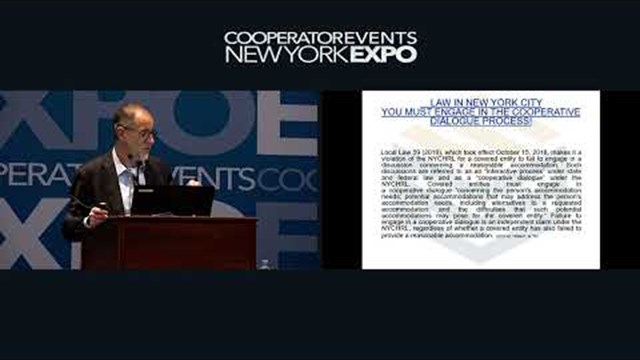Increasingly, those who manage residential rental, cooperative, or condominium apartment dwellings in New York are learning they must walk a fine line in setting house rules that govern the ownership and acceptance of animals in their buildings. Landlords, volunteer board members of cooperatives and condominiums, and the managing agents of buildings can no longer maintain or implement house rules that unqualifiedly ban all animals from the premises. Persons with disabilities who require a service, therapy, or emotional support assistance animal to support or assist their physical and/or emotional needs are protected by federal, state, and local antidiscrimination laws, and, to ensure compliance and avoid liability, buildings with a “no pet” policy must adapt their rules to the laws’ requirements.
Defining a Disability
Each of the applicable laws defines “disability” or “handicap” in slightly different ways, but all of the laws essentially agree on the circumstances under which a person is deemed to be disabled. Under federal law, a person is deemed disabled if he or she has a physical or mental impairment that substantially limits one or more major life activities and there is a record of such impairment or the person is regarded as having the impairment. New York State and New York City antidiscrimination statutes cover the same general areas but, in addition, reference particular physical and mental impairments deemed to be disabilities within the broader categories.
It is becoming apparent that the managers of residential buildings—whether landlords, boards, and/or their managing agents—are being called upon with some frequency to issue waivers from existing “no pet” policies, and waiver requests from disabled residents or applicants for residency are growing at a rapid pace.
In addressing waiver requests, landlords, boards, and managing agents must be sensitive to the fact that there are multiple categories of disabilities for which animal support or assistance may be appropriate and medically required. It is important too that they understand that many disabilities of a physical nature (such as blindness or lameness) are readily apparent, but other physical disabilities (such as deafness), and those of an emotional or psychological nature, are not readily apparent or easily recognized. They need to appreciate also that there are multiple categories of assistance animals, and, similarly, that there are both assistance animals whose support to the disabled person is immediately apparent and assistance animals whose assistance and support is not immediately apparent, but whose presence may be essential to the well-being of the disabled person.
What is a Service Animal?
The most recognized category of assistance animals is the service animal, which is defined by the Americans with Disabilities Act (“ADA”) as “any guide dog, signal dog, or other animal individually trained to provide assistance to a person with a disability.” In New York City, service dogs are issued a tag indicating that the dog has been trained to perform a task to assist a person with a disability. However, animals other than dogs may also qualify as service animals, under the Fair Housing Act and State antidiscrimination laws, if they have the requisite training. Nevertheless, animals without special training are equally protected under the law, if they do provide physical or emotional support, lessen the effects of a person’s disability, and are necessary for the person to be able to fully enjoy the housing.
In this legal environment, almost any animal may qualify for a waiver. Therefore, it is important that buildings with “no pet” policies be able to clearly distinguish assistance animals from ordinary pets and companion animals. House rules should be reviewed and updated, wherever appropriate, to clearly state and enable the implementation of a waiver application process that does not violate the legal mandate to reasonably accommodate a disabled resident’s need for a service or other assistance animal.
A waiver process that addresses the following points should be implemented by any building management (whether landlord or condominium or cooperative board) that wishes to maintain a general “no pet” policy for all residents other than those who have a disability for which an assistance animal is required:
The “no pet” house rule should make it clear that it is the responsibility of the disabled resident to advise the management in writing of the resident’s disability and the need for an assistance animal. Except in the case of a resident whose disability is readily discernible, it is not management’s duty to seek out the disabled resident and ask whether the resident wants a waiver. Unless a waiver is requested, any animal not clearly perceived to be an assistance animal may be presumed to be a pet or companion animal and, therefore, may otherwise be subject to the building’s “no pet” policy. This should apply equally to the animals of any guests of the disabled resident.
Once advised by the resident of his or her disability status, management is permitted to make a reasonable and limited inquiry concerning the nature of the disability and how an assistance animal is expected to provide assistance or support for the resident’s particular disability. Where the nature of the disability, as in the case of blindness, is readily discernible, no inquiry is permitted. However, in all other cases, as part of the waiver process, the resident may be requested to submit a written statement from his or her medical professional, therapist, or clinical social worker attesting to the physical or emotional need of the resident to possess an assistance animal. With the consent of the resident, management may contact these professionals, but only to verify the disability and to obtain information necessary to evaluate whether the assistance animal is needed because of the disability. Inquiring for detailed information about the nature of the disability is not permitted. It is recommended that all such contacts be made by an attorney.
Granting a Waiver
Despite the granting of a waiver by the building management, the owner of any service, therapy, or emotional support dog is still obliged to comply with the local municipal laws that otherwise apply generally to all dogs. Therefore, prior to occupancy in the building of any service, therapy, or emotional support dog, the resident may be required to submit proof that the dog is duly licensed by the City of New York and proof that the dog has received such vaccinations as the law requires. Proof of vaccinations may also be requested for any other service, therapy, or emotional support animal for which vaccinations are required by law.
House rules may also govern the ownership and use of assistance animals in the building in other non-discriminatory ways. For example, the disabled resident may be requested to provide photographs of the face and body of all animals living in his or her apartment. Such photographs may be kept on file to ensure that a particular animal in the building is indeed the animal for which the “no pet” waiver has been given. In addition to such photographs, the resident may be requested to provide a written statement setting forth the animal’s species, approximate age, weight, breed, if any, and colors, but such rules may not be used to limit the size or weight of any assistance animal.
Service, therapy, or emotional support animals are free to enter all common areas of the building, but house rules may require that the animals be either carried or on a leash. Moreover, notwithstanding the granting of a waiver of the “no pet” policy, house rules may specify that the assistance animal of a disabled resident will be allowed on passenger elevators only with and under the control of the resident to whom the waiver has been given for that animal. Any such animal in the temporary custody or control of a person other than the owner of the animal, such as a dog walker or guest, may be required to use the service elevator when it is in operation. (Residents may be advised to verify the availability of the service elevator by calling their building doorman.)
Any waiver of the building’s “no pet” policy may be revoked whenever an assistance animal behaves habitually in such a manner as to constitute a nuisance. Such behavior may include, but is not limited to, repeatedly causing damage to or soiling the common areas of the building, repeated loud and excessive barking or whining disturbing to other residents of the building, repeated disobedience of and/or lack of control by its owner or handler, or any behavior that poses a danger to the health or safety of any person in the building. Any animal deemed a nuisance may be subject to removal from the building. It is recommended that house rules provide for such removal upon 30-days written notice, unless the owner or handler corrects the animal’s behavior within such time, but upon 24-hour written notice if the animal poses an immediate danger to health or safety. House rules should also reserve the right to revoke a waiver whenever it is made known, or becomes evident, to the management that the person granted the waiver no longer suffers from a disability for which an assistance animal is required. Learn the Law
As noted above, the managers of residential buildings, whether they be landlords, boards of condominiums or of cooperative corporations, or their managing agents, and the attorneys advising such clients, need to become familiar with all of the various layers of laws and regulations that govern the acceptance of assistance animals in housing and the manner in which waivers of “no pet” policies may be processed and granted. The need to do so is becoming more and more evident, and the need to distinguish between genuine requests requiring the granting of a waiver, and possible sham requests made with the implied threat of a civil rights complaint, dictates that clear and non-discriminatory procedures be implemented and routinely followed to ensure that a building’s management team may at all times process “no pet” waiver applications in good faith without an inordinate fear of potential liability. n
Adam Leitman Bailey is the founding partner of Adam Leitman Bailey, P.C. John M. Desiderio, a partner and chair of the firms’ Real Estate Litigation Group, co-authored the article.







Leave a Comment